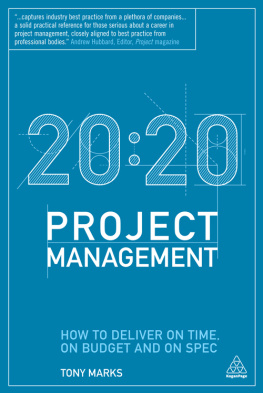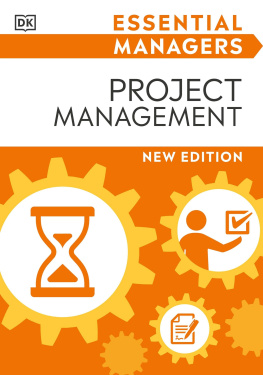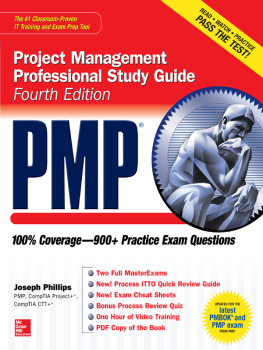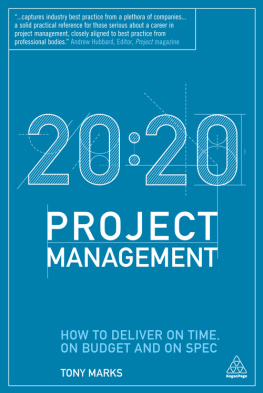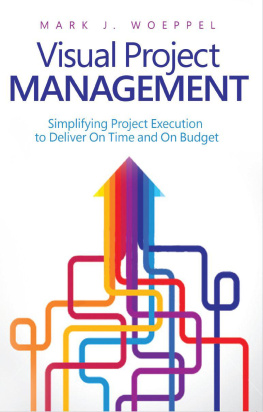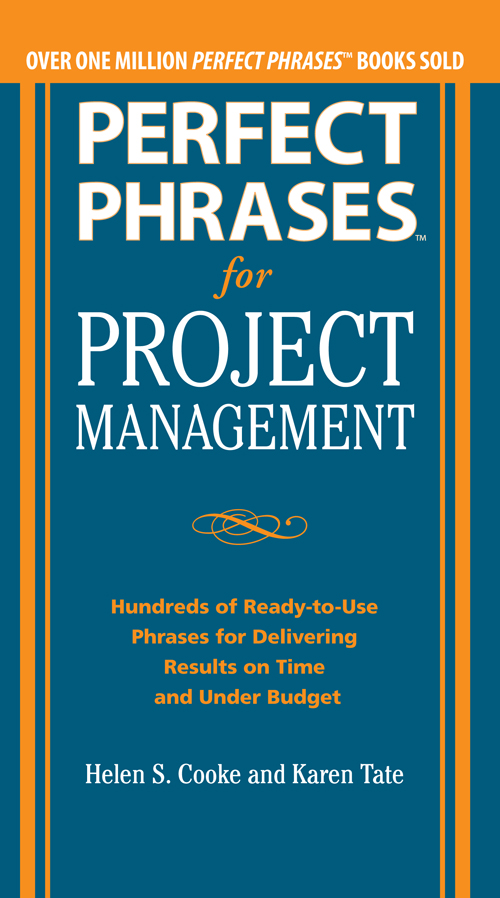
PERFECT PHRASES
for
PROJECT MANAGEMENT

Hundreds of Ready-to-Use Phrases for
Delivering Results on Time and Under Budget
Helen S. Cooke, PMP
Karen Tate, PMP


Copyright 2012 by The McGraw-Hill Companies, Inc. All rights reserved. Printed in the United States of America. Except as permitted under the United States Copyright Act of 1976, no part of this publication may be reproduced or distributed in any form or by any means, or stored in a database or retrieval system, without the prior written permission of the publisher.
ISBN 978-0-07-179379-7
MHID 0-07-179379-8
e-ISBN 978-0-07-179380-3
e-MHID 0-07-179380-1
Trademarks: McGraw-Hill, the McGraw-Hill Publishing logo, Perfect Phrases, and related trade dress are trademarks or registered trademarks of The McGraw-Hill Companies and/or its affiliates in the United States and other countries and may not be used without written permission. All other trademarks are the property of their respective owners. The McGraw-Hill Companies is not associated with any product or vendor mentioned in this book.
McGraw-Hill books are available at special quantity discounts to use as premiums and sales promotions or for use in corporate training programs. To contact a representative, please e-mail us at .
This book is printed on acid-free paper.
Contents
Thanks to spouses, PMI, people of each continent for lessons!
Preface
P roject management has been around for thousands of years, but it is only in the past few decades that it has been structured as a professional management practice, with processes and methods that work time after time. If you are reading this book, you are most likely involved in a project or are about to be. Project management is a field of work populated by individuals who have chosen this particular practice of management as their profession. Some project management professionals are specifically project managers. Others can be program managers, scheduling specialists, or experts in some specific functional area unique to projects. The Project Management Institute promotes common definitions and standards so that people who work in project management can work together across occupational and geographic boundaries. In the publication of the Project Management Body of Knowledge (PMBOK Guide)one of its key standardsprojects and project management are defined. A project is a temporary endeavor undertaken to create a unique product, service, or result, and project management is the application of knowledge, skills, tools, and techniques to project activities to meet the project requirements. Projects are carried out by people, and special roles and rules apply when managing teams and getting results within specified constraints. Traditional managers can enlist the help of superiors in resolving problems or allow time for things to work themselves out. Project managers need to identify solutions and get results quickly within the team. While some projects are not large or complex enough to require a certified professional in every role, others are. The people who manage projects of significant importance and complexity, such as the launch of a space shuttle or a new energy processing facility, often have certified project management professionals in every key role on the project. But even smaller or less complex projects benefit by good project management. Many of the good practices across projects are presented throughout this book.
Since a project is a temporary endeavor, it has a clear beginning and a clear end. Projects are launched to create a unique product, service, or result (referred to as deliverables). It can mean doing something for the first time, and doing so in such a way as to minimize risk and maximize intended outcomes, reorganizing something in a way different from what it was before, integrating complex changes into an existing environment, improving things to operate in a new way, or creating new products or services.
If we could get desired results doing things as we have always done themusing normal operations processes, for instancewe would not need to create a project. We would simply get it done. But for many kinds of projects no normal operations processes exist. The projects are formed because key results and products and services are vital, yet they simply cannot be produced doing things the way we have always done them. We need a new way to do it, perhaps a different mix of people or a different combination of processes or a completely new product or service. Project management offers ways to manage the risks and unknowns that come with creating something new. The new product or service is created by the project manager and team using project management. Then it is handed over to operations, who assume responsibility for its use, maintenance, and improvement.
Project management is a broad management discipline crossing all occupations and industries using recognized tools and techniques based on global standards. Projects are managed in a similar way around the world. When an organization manages work using familiar day-to-day business processes, these routine processes have been refined by repetition as people perform their daily tasks. Periodically the processes are improved by experienced workers. Most experienced workers are familiar with them and can quickly form work teams to get things done. With projects, this luxury is not available to the team. Very often, new processes and ways of doing things have to be defined anew.
Because each project is unique, the project management processes become the teams new structure for performing work. The organization that typically has departments, job descriptions, and supervisory reporting channels also has accepted measures of work effectiveness and product quality. On a project, these same needs exist, but the methods, roles, and rules on a project are not the same as the ones used when performing routine work. It is the responsibility of the project manager and team to create the work structure for the project and define acceptance criteria and requirements. Projects are generally one-off.
The project team members will need to know how to work together, with role descriptions, reporting channels, policies, and quality measures for their work. They may be more narrow and simpler, but they still are necessary to structure work and guide team decisions during the project period. Many organizations that rely on projects to do their work and keep their products and services competitive in the marketplace will have project management processes, roles, and management support systems in place that are built just for running projects. Others do not.
Whether your organization is experienced at running projects or new to the process, whether it has a project management infrastructure or not, this book can provide value. The phrases in this book will help you state the needed ideas the team members must address or, by your words and communications, shape the expectations and involvement of managers, customers, and users of the projects eventual product or service.
Next page


